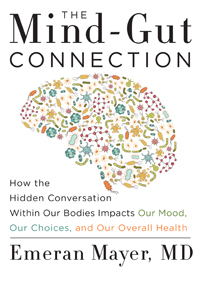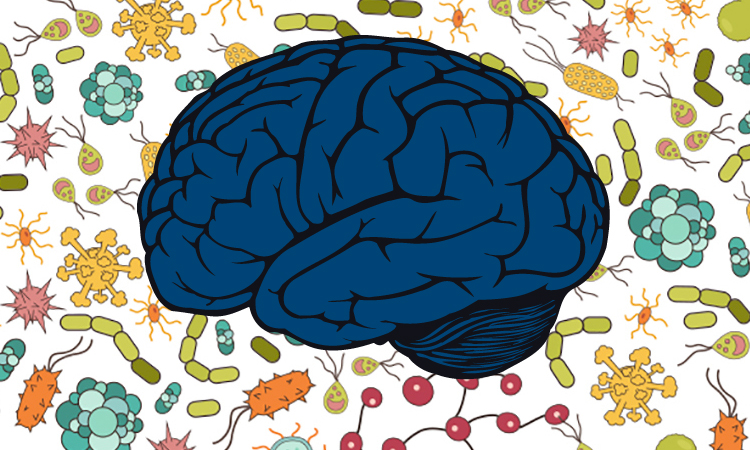Have you ever felt nauseous when you’re nervous or experienced that “gut feeling” when something isn’t right? That sensation is actually your gut talking to your brain. How about when you feel butterflies in your stomach? That’s your mental state affecting your digestive system. Whether you’re feeling anxious about a job interview or stressed about a disagreement with your significant other, they will often translate into some sort of physical response.
 This excerpt from Dr. Emeran Mayer’s new book, The Mind-Gut Connection: How the Hidden Conversation Within Our Bodies Impacts Our Mood, Our Choices, and Our Overall Health, explains how the dynamic of maintaining a healthy gut microbiome will positively influence your health.
This excerpt from Dr. Emeran Mayer’s new book, The Mind-Gut Connection: How the Hidden Conversation Within Our Bodies Impacts Our Mood, Our Choices, and Our Overall Health, explains how the dynamic of maintaining a healthy gut microbiome will positively influence your health.
As we rapidly untangle the complex chemical conversations between microbes, the gut, and the nervous system, we’re also extracting valuable information about how to apply this knowledge to improve people’s health.
[…] Microbiota consist of many interacting species, which makes it difficult to control, add, or target individual species without affecting the overall ecological balance. In the distant future, expensive new treatments that use nanotechnologies and genetically engineered probiotic to manipulate our own microbiota may be able to target individual microbes within a complex ecosystem, but for the foreseeable future, it may not be the practical way to go.
Instead, there are approaches that anyone can take today without spending a lot of money. In a recent Science article, Jonas Schluter and Kevin Foster, of the University of Oxford, propose that we act as “ecosystem engineers” and manipulate general, system-wide properties of microbial communities to our benefit. This implies that you have a basic understanding of the building plans of the system and should always be skeptical of simplistic solutions that are promoted with the promise to optimize your health.
How can we do this?
Practice natural and organic farming of your gut microbiome.
Consider your gut microbiome as a farm and your microbiota as your own personal farm animals, then decide what to feed them to optimize their diversity, stability and health, and optimize production of beneficial signaling molecules that affect our brains.
Cut down on animal fat in your diet.
All of the animal fat in the typical North American diet, regardless if it is visible or hidden in many processed foods, is bad for your health. It plays a major role in increasing your waistline, and recent data has showed that processed meat, which has a particularly high fat content, enhances your risk of developing several types of malignancies, including cancers of the breast, colon and prostate.
Maximize your gut microbial diversity.
If you want to maximize your gut microbial diversity, increase its resilience, and reduce your vulnerability to chronic diseases of the brain, follow the old advice of nutritionists, cardiologists and public health officials: in addition to eating moderate quantities of meats low in fat, mainly from fish and poultry, increase your intake of food items that contain multiple prebiotics in the form of different plant fibers, a combination of food items that we know today leads to greater gut microbial diversity.
Avoid mass-produced and processed foods and maximize organically grown food.
Buy only things in the market that look like food. If they don’t they most likely will contain food additives that could harm your brain, including artificial sweeteners, emulsifiers, fructose corn syrup, and vital gluten, to name a few. For the same reasons, watch out for the hidden dangers in food you buy in the supermarket. Read labels to find out components and additives in a food item; try to find out where it comes from.
Eat fermented foods and probiotics.
While the science is still evolving, it’s still prudent to maximize your regular intake of fermented food products and all types of probiotics to maintain gut microbial diversity, especially during times of stress, antibiotic intake, and old age. All fermented foods contain probiotics—live microorganisms with potential health benefits, and a few commercially available probiotics contained in fermented milk products, drinks, or in pill form, have been evaluated for their health benefits.
Eat smaller portions.
This limits the calories you consume, keeping the amount in line with your body’s metabolic needs, and simultaneously reduces your fat intake. While eating packaged foods, be aware of the recommended serving size on the label.
Don’t eat when you are stressed, angry or sad.
We’ve seen that emotions have a profound effect on the gut and the microbial environment in the form of gut reactions. A negative emotional state will throw the gut-microbiota-brain-axis out of balance in several ways. It makes your gut leakier, it activates your gut-based immune system, and it triggers endocrine cells in the gut wall to release signaling molecules such as the stress hormone norepinephrine and serotonin.
Science has come a long way in keeping us informed about our gut health. By bringing more awareness to our gut, and what we put in it, we can make a substantial difference in our overall health.

Rose Caiola
Inspired. Rewired.



